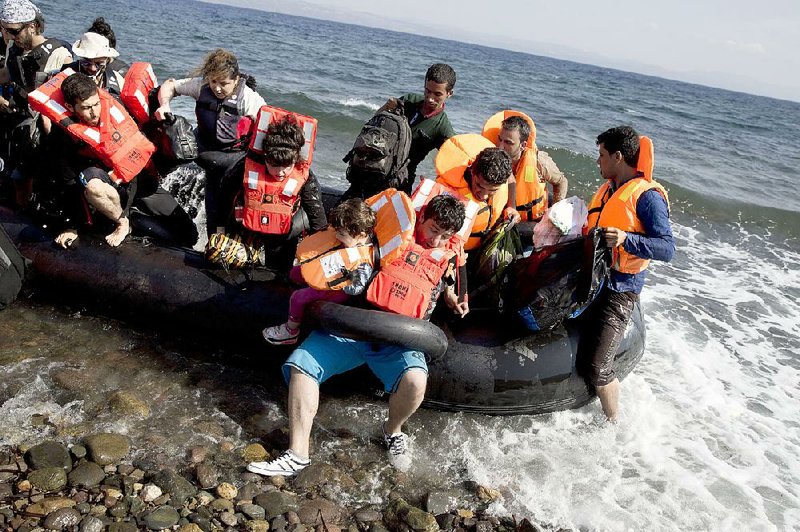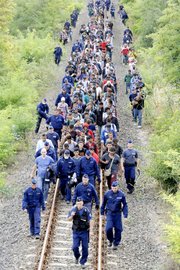BUDAPEST, Hungary -- Leaders of the United Nations refugee agency warned Tuesday that Hungary faces a bigger wave of 42,000 asylum seekers in the next 10 days and will need international help to provide shelter on its border, where newcomers already are complaining about being left to sleep in frigid fields.
The warning came the same day that Germany and Sweden appealed for other European nations to embrace their responsibilities by taking in their fair share of migrants.
Officials from the Office of the U.N. High Commissioner for Refugees said it was sending tents, beds and thermal blankets to Hungary's border with Serbia, where for the past two days groups from the Middle East, Asia and Africa have ignored police instructions to stay put and instead have marched on a highway north to Budapest.
Commissioner Antonio Guterres accused the entire European Union of failing to see the crisis coming or take coordinated action even though the 28-nation bloc of 508 million people should have enough room and resources to absorb hundreds of thousands of newcomers with ease.
There was needless suffering in the migration crisis "because Europe is not organized to deal with it, because the European asylum system has been extremely dysfunctional and in recent weeks completely chaotic," Guterres said. He said at a news conference in Paris that it appeared "clear that if Europe would be properly organized, it would be a manageable crisis."
The EU has struggled, in part, because front-line nations such as Hungary and Greece have not put enough facilities in place to house a human flow averaging 2,000 to 3,000 a day while the vast majority of people try to push deeper into Europe and seek refugee protection in Germany, the nation accepting the greatest number by far.
Germany already expects to take in 800,000 this year, and Vice Chancellor Sigmar Gabriel said Tuesday that it could take another 1 million over the next two years. Many EU members have yet to follow Germany's lead, and Hungary's government instead is focusing on building a border fence to block the route from Serbia. It is planning a series of frontier security measures that it hopes to start enforcing next Tuesday, although international observers are skeptical.
The U.N. agency's refugee coordinator for Europe, Vincent Cochetel, said at a Budapest news conference that Hungary could not cope on its own with the asylum seekers. He said 42,000 people -- 30,000 in Greece, 7,000 in Macedonia and 5,000 in Serbia -- were likely to enter Hungary in the next 10 days, requiring greater international help.
"We need better coordination to make sure we don't have chaos at the border," he said, chiding Hungary for allowing people to be left overnight "in a very dire situation."
Hungary has left hundreds of migrants near the border village of Roszke waiting for buses that arrive infrequently, leaving large numbers stranded at night. Officers have found it increasingly difficult to keep them within a designated field. Some have pushed through police lines and walked north deeper into Hungary, while others head south and return to Serbia, where camps are sometimes better organized.
On Monday, a few hundred people broke through police lines near Roszke and, despite being hit with pepper spray, made it onto the main highway linking Serbia with Budapest. It happened again Tuesday night after a day of scuffles with officers in which one man was injured during a stampede.
The government has given little aid, leaving volunteer groups to provide food and water instead. The field near Roszke has become strewn with garbage.
At Budapest's main international train station, more than 300 people -- mostly asylum seekers -- queued for tickets. Last week, Keleti station became an open-air refugee camp when Hungary briefly stopped migrants from taking trains to Austria and Germany. Authorities are once again letting those travelers take trains deeper into the EU, although they often ride in separate carriages from other passengers.
In Greece, the coast guard said its patrol vessels picked up nearly 500 people in small boats in the eastern Aegean Sea near the islands of Lesbos, Samos and Kos and the islet of Agathonissi.
More than 15,000 are on Lesbos awaiting screening before they can board a ferry to the Greek mainland. Although Greece is an EU member, migrants have for years freely left its asylum system and headed north through Macedonia and Serbia into Hungary and, from there, to western Europe. EU rules require that refugees seek asylum in the country of their arrival.
Distribution plan
Germany and Sweden appealed Tuesday for other European nations to embrace their responsibilities by taking in their fair shares of migrants, as President Jean-Claude Juncker of the European Commission prepared to unveil a proposal today calling for refugees to be distributed across the 28-member bloc.
Chancellor Angela Merkel of Germany said the solution to the crisis would be "binding quotas" set according to each nation's size and economic capacity.
Merkel was seconded by Swedish Prime Minister Stefan Lofven, whose country has admitted even more refugees per capita than Germany. At a joint news conference, Lofven said it was morally incumbent on Europe to give sanctuary to legitimate asylum seekers.
Juncker is expected to announce a proposal for the distribution of 160,000 migrants across the bloc. But when such a so-called quota proposal was floated in the past, it drew fierce opposition.
Most adamant were countries in eastern or central Europe, like Hungary, which consider asylum decisions a matter of national sovereignty and have robustly argued against policies that they fear could undermine the bloc's security and encourage more migration.
Merkel said that, in addition to negotiating a binding solution for equal distribution of migrants, Europe needed to improve cooperation with Turkey, which has taken in hundreds of thousands of Syrians but has also become a major transit country for those trying to reach northern Europe.
Merkel spoke by telephone with the Turkish prime minister, Ahmet Davutoglu, on Tuesday to discuss the migrant crisis and how to move toward a lasting solution, the chancellor's office said.
Lofven said that neither his country nor Germany was "closing our eyes to this humanitarian catastrophe."
Austrian Chancellor Werner Faymann said countries opposed to taking in refugees under an EU-wide quota system plan backed by Germany and France should suffer financial penalties.
Spain, which had previously agreed to receive fewer than 3,000 refugees, said Tuesday that it would abide by a quota imposed by the EU.
Poland also said Tuesday that it could receive more than the 2,000 people it has so far agreed to admit as long as the newcomers were genuine refugees fleeing for their lives and not simply migrants in search of better economic opportunities.
In Britain, Parliament was to hold an emergency debate Tuesday on the country's response to the Syrian refugee crisis, the BBC reported, after several lawmakers said the government's plan to accept 20,000 people from Syria over the next five years was inadequate.
Australian Prime Minister Tony Abbott said today that his country will resettle an additional 12,000 refugees, as well as launch airstrikes against Islamic State targets in Syria within days.
He also announced that his government will pay an additional $31 million to keep 240,000 Syrians and Iraqis in refugee camps in Jordan, Lebanon and Turkey.
Australia has been bombing targets in Iraq since October as part of the U.S.-led coalition against the Islamic State. Australia is moving across the border, where the legality of airstrikes is less clear, at the request of the United States.
The growing stream of migrants into Europe comes as intense fighting in Syria has driven more people to flee in recent weeks and as deteriorating conditions in neighboring countries are pushing many to head straight for Europe, the U.N. refugee agency said Tuesday.
At the same time, U.N. agencies reported that low levels of funding were forcing them to cut food and other aid to hundreds of thousands of Syrians, another factor pushing many to embark on hazardous journeys to Europe.
Beyond Europe, the United States and Persian Gulf states received criticism by the U.N. on Tuesday for not resettling more Syrian refugees. Though some have given large sums of money in humanitarian aid, that was "not enough," a senior U.N. official said.
"Taking refugees is separate from giving money," Peter Sutherland, U.N. Secretary-General Ban Ki-moon's special representative on migration, told reporters in Geneva.
"Buying your way out of this is not satisfactory," Sutherland said. Even so, U.N. members had not provided nearly enough funding for existing relief efforts, he added.
Information for this article was contributed by Pablo Gorondi, Shawn Pogatchnik, Alexander Kuli, Balint Szlanko, Monika Scislowska, Frank Jordans, David Rising, Jamey Keaten, George Jahn, Rod McGuirk and staff members of The Associated Press; by Dan Bilefsky and Melissa Eddy of The New York Times; and by Henry Chu of the Los Angeles Times.
A Section on 09/09/2015


